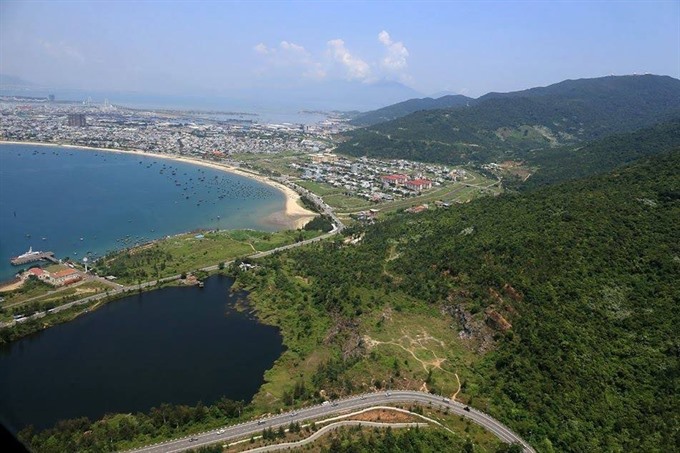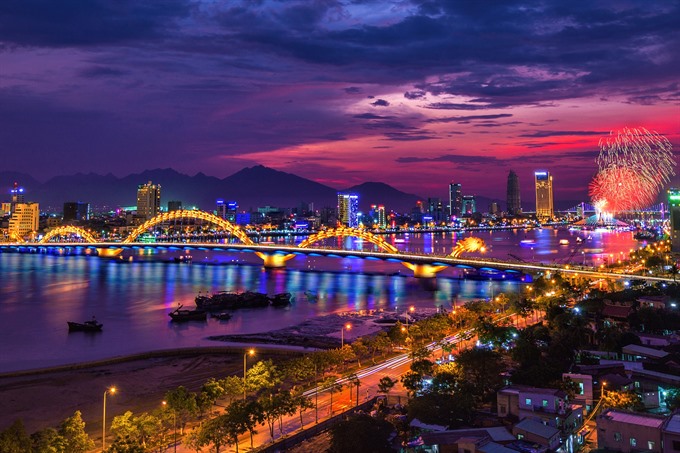 Environment
Environment

The central city of Đà Nẵng was awarded the title National Capital of the World Wide Fund for Nature (WWF)’s One Planet City Challenge 2018 programme in a ceremony on Friday, making it the only city in Việt Nam to join a list of 21 cities around the world for the final round of the global award.
 |
| An overview of the Sơn Trà Nature Reserve in Đà Nẵng city. The city was recognised as a National Capital of the World Wide Fund for Nature (WWF)’s One Planet City Challenge 2018 programme. — Photo courtesy of Helicop tour |
ĐÀ NẴNG — The central city was awarded the title National Capital of the World Wide Fund for Nature (WWF)’s One Planet City Challenge 2018 programme in a ceremony on Friday, making it the only city in Việt Nam to join a list of 21 cities around the world for the final round of the global award.
Vice chairman of the city’s People’s Committee, Nguyễn Ngọc Tuấn said the title was seen as the result of great efforts made by the city with support from WWF Việt Nam in building plans on the reduction of Green House Gas (GHG) and carbon emissions as well as smart traffic and energy-saving measures over the past several years.
“We have strongly committed to cut 25 per cent of carbon emissions into the environment in 2030 by promoting the use of renewable energy in buildings and vehicles. The city also plans to generate power from garbage burning as well as boosting energy efficiency in production and service,” Tuấn said.
He said the “green” title will be a driving force for the city to develop more action plans in building Đà Nẵng as a “smart and green” city by 2025.
Tuấn said Đà Nẵng had submitted plans for solar power development, biofuel use, Bus Rapid Transit (BRT) routes and wastewater treatment.
Two solar power projects with total capacity of 7.4 megawatt (MW) have been scheduled for construction at the already-closed Khánh Sơn dump and the Đà Nẵng International Airport in the coming time.
Director of WWF Việt Nam Văn Ngọc Thịnh said Đà Nẵng had positively promoted its commitment and action plans to attain the “green” title.
He said the city, with unique nature and protected areas, is seen as the most livable city in Việt Nam.
Thịnh said the Sơn Trà Nature Reserve, just 10km from the city’s downtown, was home to only 20 individuals of the red-shanked douc langur (Pygathryx nemaeus) – the endangered primates species – 20 years ago, but the population has drastically increased.
“The city has such a great value of nature that many biologists in the world are amazed at the protection of the endangered primates and rich biodiversity. It is seen as the rare city with forests ranging from sea to mountain linking with the Bà Nà Nature Reserve and Bạch Mã National Park in Thừa Thiên-Huế Province,” Thịnh said.
Đà Nẵng, along with other cities in Việt Nam including Huế (Thừa Thiên - Huế Province), Hội An (Quảng Nam Province) and Đông Hà (Quảng Trị Province), entered the One Planet City Challenge programme in 2017 to show how cities can become hubs for creativity, ambition and innovation in dealing with climate change.
The four cities were qualified out of 132 metropolises from 23 countries, but Đà Nẵng was finally selected for the award.
According to a WWF statement, cities generate 70 per cent of the world’s carbon emissions, and the WWF’s One Planet City Challenge was a biennial competition that recognised and rewarded cities for developing infrastructure, housing, transport and mobility solutions to power the global transition to a low-carbon, climate-resilient future.
It said 50 per cent of the global population lived in urban areas, and cities would be home to about 10 billion people by 2050.
In 2012, Đà Nẵng City was selected for an Asia-Pacific Economic Co-operation project along with 20 low-carbon model cities with energy-efficient technologies, smart grids and renewable power generation.
The city had cut 12,000 tonnes of carbon emissions through a pilot project of low-carbon models including battery-powered bicycles, renewable energy, a metro system and BRT between 2008-11.
The central city has started a pilot project using low carbon emission light-emitting diode (LED) bulbs in 19 main downtown streets to save an estimated 1 million Kilowatts per hour (KWh) per year by 2020.
According to the city’s Department of Industry and Trade, around 30 per cent of the city’s population is using solar power for water heaters, while around 20 five-star hotels and resorts were using solar power water heating systems.
The One Planet City Challenge was designed by the WWF to mobilise action and support from cities in global climate efforts, including the goals now set forth by the Paris Agreement. About 400 cities in the world have joined the programme since 2011. — VNS
 |
| The Rồng (Dragon) bridge spans the Hàn River in Đà Nẵng city. — Photo courtesy ASA Studio |




